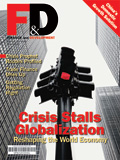 View this Issue Archive of F&D Issues Subscribe to Print Edition United States and the IMF United States and the IMF Write to us F&D welcomes comments and brief letters, a selection of which are posted under Letters to the Editor. Letters may be edited. Please send your letters to: fanddletters@imf.org. F&D Magazine Free Email Notification Receive emails when we post new
items of interest to you. |
In Brief IMF seeks to double resources Japan has provided the IMF with an additional $100 billion to bolster the Fund’s lendable resources during the current global economic and financial crisis. The IMF said the additional funds, signed over on February 13, would strengthen its capacity to provide timely and effective balance of payments assistance to its 185 member governments. The IMF has so far committed about $50 billion in lending to a number of economies affected by the crisis, including most recently to Belarus, Latvia, and Pakistan. With global growth expected to grind to a virtual halt in 2009, the IMF anticipates it will receive more requests for financial assistance in the coming months. Apart from the new money from Japan, the IMF has about $200 billion in lendable resources. Managing Director Dominique Strauss-Kahn wants to boost the IMF’s lendable funds to about $500 billion, both as a precaution in case the crisis gets worse and as reassurance that the IMF can meet any eventuality. The IMF’s executive Board is considering a number of ways to strengthen the Fund’s resources, including boosting its concessional resources for poorer countries. Vulnerability Fund World Bank President Robert B. Zoellick has called on developed countries to dedicate 0.7 percent of their economic stimulus packages to a “Vulnerability Fund” for developing countries affected by the global downturn. Zoellick made this plea ahead of the 39th World economic Forum in Davos, Switzerland, in late January. Such a fund could speed resources to existing World Bank, United Nations, and regional development bank safety net programs that provide access to health, education, and nutrition services; help build infrastructure; and support small and medium-sized businesses and microfinance institutions that lend to the poor, Zoellick said. “Poor people in Africa should not pay the price for a crisis that originated in America,” Zoellick noted in a New York Times op-ed on January 22. New publication series The IMF has launched a new publication series, Staff Position Notes, to showcase its staff ’s policy analysis and research on topical issues. In the latest note, “Foreclosure Mitigation efforts in the United States: Approaches and Challenges,” authors John Kiff and Vladimir Klyuev observe that foreclosures in the United States have risen to the highest levels since the Great Depression—despite the fact that they lead to substantial loss of value for both the lender and the borrower. The paper lays out a plan for stemming foreclosures and resolving the broader problems in the U.S. housing market. Other recent titles have examined fiscal policy in times of crisis and how to gauge a country’s vulnerability to deflation. To read Staff Position Notes, visit www.imf.org/external/ns/cs.aspx?id=236. Events in 2009 April 2, London, United Kingdom April 14–16, Rio de Janeiro, Brazil April 25–26, Washington, D.C. May 2–5, Bali, Indonesia May 13–14, Dakar, Senegal May 15–16, London, United Kingdom July 8–10, La Maddalena, Italy October 6–7, Istanbul, Turkey |